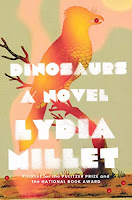And it’s a good thing, too, because when we meet this protagonist, he pines for the woman who has figuratively sent him packing. He takes more than his share of abuse from her; she has spent years in a relationship with him because she’s aware that he has money—how much money she isn’t too clear on, and that’s probably a good thing, too. But Gil is an unusual case: his parents die in a car crash when he’s ten, so before he comes—completely unexpectedly—into his inheritance at 18, he was shunted from relative to uncaring relative. During this period he had nothing. Gil arrives in the desert friendless, without an agenda for his life, and nearly devoid of self-esteem. Without overtly articulating it, he needs to grow, he longs for it.
He sets out to do something after he leaves New York. He volunteers at a home for abused women, takes a benevolent interest in his next-door neighbor’s two children, and stalks the heinous man who illegally hunts raptor birds. Eventually he becomes entangled in a complicated romantic situation, fraught with secrets, during which his motivations and actions center around the interests of the others involved. He remains unselfish to the core.
In this sweet, subtle novel, Gil’s motivation and his growth hold center stage; these features hold, and eventually gratify, our rooting sympathies.
Yet again Millet holds our interest and attention. And especially our hearts. She proves her versatility, her wisdom, and her moral compass yet again to her appreciating audience. This one is definitely recommended.


















No comments
Post a Comment